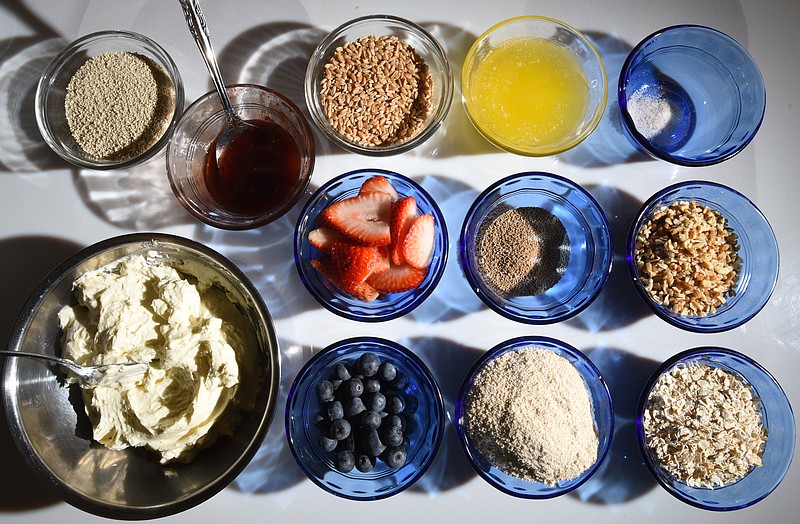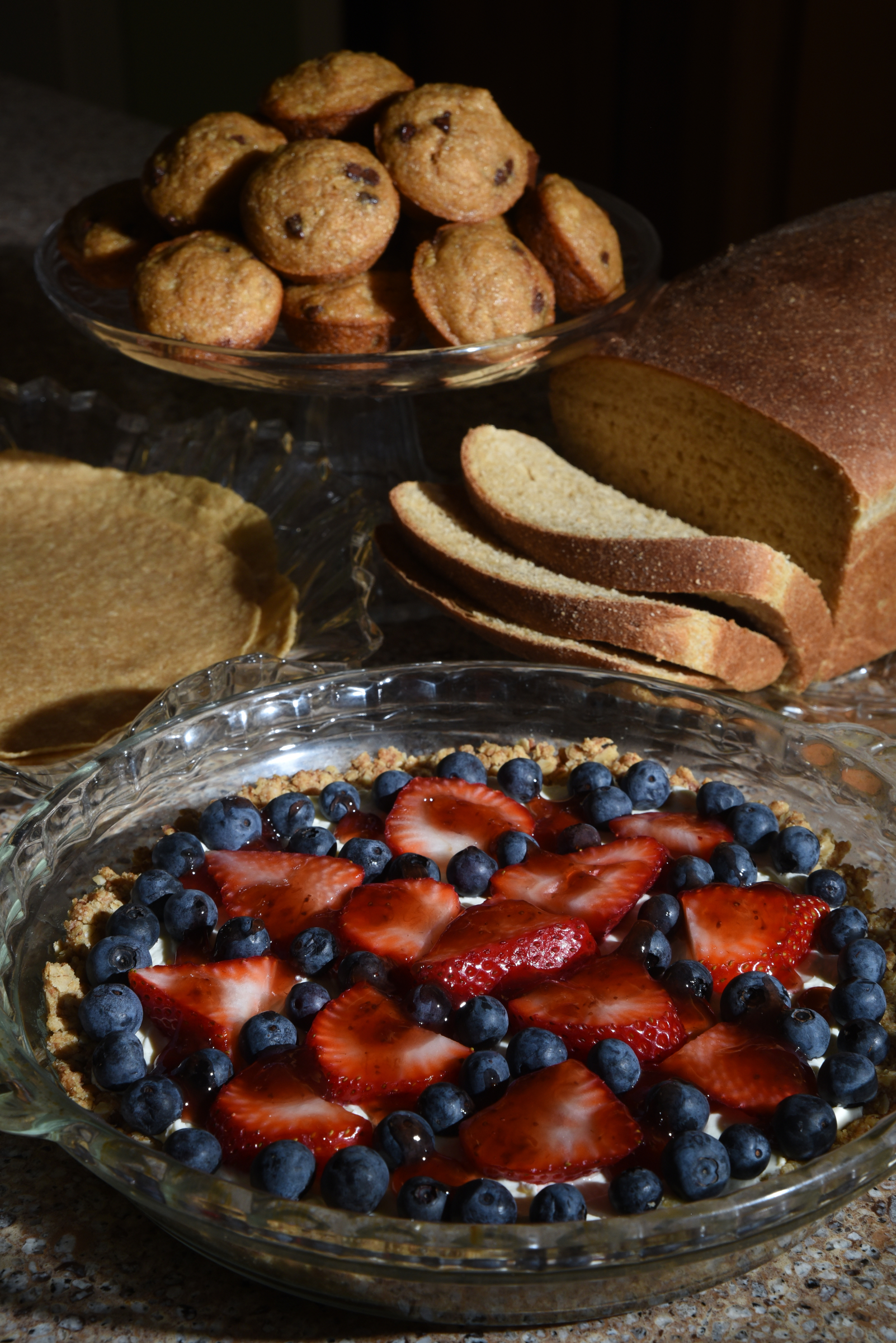Rhonda Carroll's Whole Wheat Banana Chocolate Chip Muffins
2 cup freshly ground whole wheat flour 1 teaspoon sea salt 1 teaspoon baking powder 1 teaspoon baking soda 1 teaspoon cinnamon 1 cup buttermilk 2 bananas, mashed cup oil cup honey 1 egg 1 teaspoon vanilla Heat oven to 350 degrees. Mix dry ingredients together. Add buttermilk, oil, honey, egg and vanilla. Mix all ingredients together and spoon into a greased muffin tin. Bake for 12-15 minutes.
It's not always fair to blame the Devil for making Christians fat. Blame devil's food cake, deviled eggs and other fatty, sugary, yummy staples of the tabletop paradise known as the Southern church supper.
These suppers cement friendships, welcome newcomers and give rejoicing a sugar buzz. And church members are forever bringing food to their pastors simply as signs of affection and, in the South, that means fried chicken, casseroles, cakes and vegetables cooked with plenty of butter, bacon drippings, fatback and, in some cases, pure lard.
The richness of the ingredients almost seem to reflect the depth of love. Call it the Paula Deen Syndrome; 14 ounces of condensed milk isn't enough rich for her bread pudding, so she mashes 12 Krispy Kreme doughnuts into the dish to make it sumptuous enough.
Cookbook recommendations
› “The Healthy Soul Food Cookbook: How to Cut the Fat but Keep the Flavor,” by Wilbert Jones, a black graduate of the École de Gastronomie Française Ritz-Escoffier in Paris. Jones’ book has low-fat, low-sugar versions of baked grits, barbecue, fried chicken, red beans and rice, even Mississippi Mud Cake.› “Treasures of Healthy Living” by Rex Russell, a Bible study-guided approach to healthy eating.
All that comfort food relieves stress even as it packs on pounds and hardens arteries. And some Chattanooga churches are wondering if that is dangerous, particularly for pastors who can't smoke, curse, get drunk or scream to relieve stress. Yummy fatty comfort food is a socially acceptable self-medication.
"Being a pastor ranks at the top of high-stress jobs. Most churches are led by one man and many of those churches expect him to do everything - CEO, preacher, counselor, maintenance, visit the sick and shut-ins. They expect him to be on call 24/7/365," says Jeff Greer, education/discipleship director at Heritage Pointe Baptist Church in Ringgold, Ga. "The pastor is responsible for speaking to the people what God wants him to say. He is responsible before Almighty God for their eternal souls. No pressure there."
Facts
One-third of U.S. pastors are obese. Young churchgoers ages 20 to 32 are 50 percent more likely to be fat when they hit 40 than young Americans who skip church. Sources: Northwestern University Feinberg School of Medicine, Baylor University
This year, a Baylor University study found one-third of American pastors are obese. But the first alert about church chub came in 2011 when Northwestern University's Feinberg School of Medicine found that young adults from 20 to 32 years old who attend church at least once weekly are 50 percent more likely to be obese by age 40 than youths who skip church entirely.
Dr. Carl Weisner, who heads Duke Divinity School's Clergy Healthy Initiative, sees the situation, hears pastors describe the gauntlet of decadent desserts and fatty foods they face at church suppers. Even if a dozen pies and cakes are on the table, "if the pastor doesn't take a piece of each, the person who made the dish will feel snubbed," he says.
Does he think skinless grilled chicken and a mixed green salad with a low-fat vinaigrette provide the same intoxicating joy of fried chicken, butter-drenched veggies and creamy desserts?
"Church congregations might not be enthused but sometimes an honest, dramatic moment will prompt change," Weisner says. "One North Carolina Methodist pastor stood in front of his congregation and told them he was dying because of what he was eating. So much of church fellowship revolves around eating that it really is important to find a way to socialize without eating food that will increase the likelihood of heart problems or diabetes."
SOLUTIONS
The Baylor study found that 15 percent of pastors must work a second job - like the Rev. Jake Carroll at The Access Church, who works full-time as an emergency paramedic because his church couldn't pay his salary for the past two years. His wife is a teacher for special-needs students. They have two preteen daughters. His church will merge with a larger congregation this fall.
"At that point, I will no longer have my job as a pastor," he says matter of factly with no anger or bitterness.
Yet Carroll and his wife, Rhonda, are focused on solutions to combating stress. Rhonda weighed 240 pounds at her college graduation. She spent decades yo-yo dieting. The hardest food to give up was baked goods, she says. But then she noticed that, in the Bible, Jesus was a healthy eater with a diet centered on grilled fish, olive oil, fruits, vegetables - and bread.
"He even called himself the Bread of Life," she observes.
Then she discovered a ministry called Flavors of Grace which advocates a healthy diet that includes bread the dieter makes herself in a particular way.
"We are a Southern Baptist congregation and currently our health insurance costs are among the highest because unfortunately, most pastors have the worst health," she says. "At my last check-up my doctor told me she has never seen blood work as good as mine."
Carroll has lost 120 pounds since her graduation, 50 of which were lost over the past three years. She bought a countertop grain mill for her home so she can grind her own fresh flour - whole wheat, rice, oat bran, chia seeds or quinoa. She either freezes the grain immediately or makes it into bread, brownies, biscuits or baked goods within 24 hours. Her research showed that was the way to preserve grain's nutrients and moisture. The resulting is flavorful, beautifully textured baked goods.
The Carrolls also bought a countertop grain mill for their church kitchen, and they changed church suppers.
"We decided to agree on one entree, whether it's roasted chicken or grilled beef or barbecue, and two sides and one type of dessert," Rhonda says." Then the congregation divided into teams so 10 people would make big pots of green beans and another team would make chocolate chip cookies and so on."
Apparently, the entire church is now focused on healthy eating. In the logo for Access Church, the "A" is made from an electrocardiogram readout. And the church's web page has a "Healthy Living" button; click on it and you find a photo of Rhonda Carroll, who's now called "our local Southern Healthy Living Expert."
"She has a strong desire to teach others how God intends for us to eat and be healthy," the website says. "She teaches every Wednesday evening at 6:30 p.m. at The Access Church for the ladies. You are invited to be a part!"
FITNESS
Churches may provide a path to portliness but the Centers for Disease Control Diabetes Prevention and Control Program also believes churches can be an influential conduit for health information. CDC oversees a federally funded and state-based program that recruits and trains members of faith-based organizations to teach their churches, choirs and clubs how to prevent diabetes.
The Brainerd Baptist Church took a big step beyond mere nutrition counseling. It opened a community center called BX which has an indoor walking track, indoor basketball court and gym with rowing machine, treadmills and stationary bikes. There are spin classes, workout classes for seniors, classes for women only, aerobics and weight training. BX Director David Rojas refuses for yoga to be taught in BX because he says the ancient practice of meditation and physical exercise has roots in Buddhism and Hinduism, which don't adhere to the same religious principles as Christianity. He also does not allow Zoomba because instructors often use music he considers offensive to Christians.
"All the exercise classes here use Christian music for background music," Rojas says.
On a recent weekday morning, it was already 93 degrees outside with 88 percent humidity and the air felt stifling. But inside the AC-cooled BX, seniors were exercising upstairs, including 93-year old World War II veteran Paul George. Kids from the neighborhood were playing basketball on the BX courts and a few adults were striding along the indoor track. Friends were gathering around the snack bar for smoothies and sandwiches. Visitors can pay $5 for a day pass or $75 for a year-long membership.
"We purchase all our equipment new; in most commercial gyms the equipment is used or has been around for years," Rojas says. "BX has helped me get in shape. I lost 30 pounds this year."
John Grubb is a volunteer at the BX. He has been a church member since 1969 and believes the BX added immensely to church members' quality of life as well as being a great amenity for the neighborhood.
"The same crew that makes meals for our church's school makes our church suppers," Grubb says. "The meals can be scrambled eggs, gravy, grits, lasagna - which does not sound like diet food. But the proportions are sensible. For dessert, when we have a soft-serve ice cream machine, the serving cups are small. When people get accustomed to unhealthy eating they forget what normal portions are like."
And if by chance a church supper triggers a caloric splurge, the gym is just a 5-minute walk from the church's front door.
Contact Lynda Edwards at ledwards@timesfreepress.com. or 423-757-6391.

